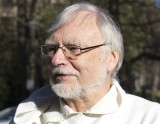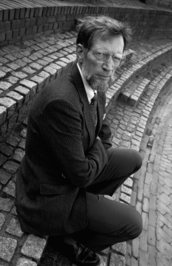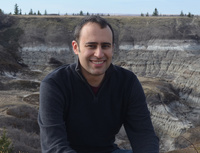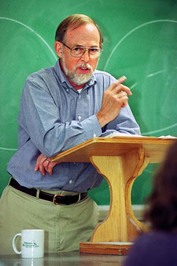
Anthony Kenny
Sir Anthony Kenny is an English philosopher whose interests lie in the philosophy of mind, ancient and scholastic philosophy, the philosophy of Wittgenstein, and the philosophy of religion.
If you like author Anthony Kenny here is the list of authors you may also like
Buy books on AmazonAnthony Kenny similar authors
-

Fergus Kerr
Fergus Kerr OP is a Dominican friar, theologian, and philosopher known primarily for his work on Thomas Aquinas and Ludwig Wittgenstein.
Buy books on Amazon -

Donald Davidson
Donald Davidson was one of the most important philosophers of the latter half of the twentieth century. His ideas, presented in a series of essays from the 1960's onwards, have been influential across a range of areas from semantic theory through to epistemology and ethics. Davidson's work exhibits a breadth of approach, as well as a unitary and systematic character, which is unusual within twentieth century analytic philosophy. Thus, although he acknowledged an important debt to W. V. O. Quine, Davidson's thought amalgamates influences (though these are not always explicit) from a variety of sources, including Quine, C. I. Lewis, Frank Ramsey, Immanuel Kant and the later Wittgenstein. And while often developed separately, Davidson's ideas
Buy books on Amazon -

Eric J. Hobsbawm
Eric John Ernest Hobsbawm was a British historian of the rise of industrial capitalism, socialism and nationalism. His best-known works include his tetralogy about what he called the "long 19th century" (The Age of Revolution: Europe 1789–1848, The Age of Capital: 1848–1875 and The Age of Empire: 1875–1914) and the "short 20th century" (The Age of Extremes), and an edited volume that introduced the influential idea of "invented traditions". A life-long Marxist, his socio-political convictions influenced the character of his work.
Buy books on Amazon
Hobsbawm was born in Alexandria, Egypt, and spent his childhood mainly in Vienna and Berlin. Following the death of his parents and the rise to power of Adolf Hitler, Hobsbawm moved to London with his adoptive fami -

Jorge Luis Borges
Jorge Francisco Isidoro Luis Borges Acevedo was an Argentine short-story writer, essayist, poet and translator regarded as a key figure in Spanish-language and international literature. His best-known works, Ficciones (transl. Fictions) and El Aleph (transl. The Aleph), published in the 1940s, are collections of short stories exploring motifs such as dreams, labyrinths, chance, infinity, archives, mirrors, fictional writers and mythology. Borges's works have contributed to philosophical literature and the fantasy genre, and have had a major influence on the magic realist movement in 20th century Latin American literature.
Buy books on Amazon
Born in Buenos Aires, Borges later moved with his family to Switzerland in 1914, where he studied at the Collège de Genèv -

Plato
Plato (Greek: Πλάτων), born Aristocles (c. 427 – 348 BC), was an ancient Greek philosopher of the Classical period who is considered a foundational thinker in Western philosophy and an innovator of the written dialogue and dialectic forms. He raised problems for what became all the major areas of both theoretical philosophy and practical philosophy, and was the founder of the Platonic Academy, a philosophical school in Athens where Plato taught the doctrines that would later become known as Platonism.
Buy books on Amazon
Plato's most famous contribution is the theory of forms (or ideas), which has been interpreted as advancing a solution to what is now known as the problem of universals. He was decisively influenced by the pre-Socratic thinkers Pythagoras, H -

Friedrich Nietzsche
Friedrich Wilhelm Nietzsche was a German classical scholar, philosopher, and critic of culture, who became one of the most influential of all modern thinkers. He began his career as a classical philologist before turning to philosophy. He became the youngest person to hold the Chair of Classical Philology at the University of Basel in 1869 at the age of 24, but resigned in 1879 due to health problems that plagued him most of his life; he completed much of his core writing in the following decade. In 1889, at age 44, he suffered a collapse and afterward a complete loss of his mental faculties, with paralysis and probably vascular dementia. He lived his remaining years in the care of his mother until her death in 1897 and then with his sister
Buy books on Amazon -

Aristotle
Aristotle (Greek: Αριστοτέλης; 384–322 BC) was an Ancient Greek philosopher and polymath. His writings cover a broad range of subjects spanning the natural sciences, philosophy, linguistics, economics, politics, psychology, and the arts. As the founder of the Peripatetic school of philosophy in the Lyceum in Athens, he began the wider Aristotelian tradition that followed, which set the groundwork for the development of modern science.
Buy books on Amazon
Little is known about Aristotle's life. He was born in the city of Stagira in northern Greece during the Classical period. His father, Nicomachus, died when Aristotle was a child, and he was brought up by a guardian. At 17 or 18, he joined Plato's Academy in Athens and remained there until the age of 37 (c. 3 -

Ludwig Wittgenstein
Ludwig Josef Johann Wittgenstein (Ph.D., Trinity College, Cambridge University, 1929) was an Austrian-British philosopher who worked primarily in logic, the philosophy of mathematics, the philosophy of mind, and the philosophy of language.
Buy books on Amazon
Described by Bertrand Russell as "the most perfect example I have ever known of genius as traditionally conceived, passionate, profound, intense, and dominating", he helped inspire two of the twentieth century's principal philosophical movements: the Vienna Circle and Oxford ordinary language philosophy. According to an end of the century poll, professional philosophers in Canada and the U.S. rank both his Tractatus Logico-Philosophicus and Philosophical Investigations among the top five most important boo -

Thomas Hobbes
Thomas Hobbes was a British philosopher and a seminal thinker of modern political philosophy. His ideas were marked by a mechanistic materialist foundation, a characterization of human nature based on greed and fear of death, and support for an absolute monarchical form of government. His 1651 book Leviathan established the foundation for most of Western political philosophy from the perspective of social contract theory.
Buy books on Amazon
He was also a scholar of classical Greek history and literature, and produced English translation of Illiad, Odyssey and History of Peloponnesian War. -

Epictetus
Epictetus was a Greek Stoic philosopher. He was probably born a slave at Hierapolis, Phrygia (present day Pamukkale, Turkey), and lived in Rome until his exile to Nicopolis in northwestern Greece, where he lived most of his life and died. His teachings were noted down and published by his pupil Arrian in his Discourses. Philosophy, he taught, is a way of life and not just a theoretical discipline. To Epictetus, all external events are determined by fate, and are thus beyond our control, but we can accept whatever happens calmly and dispassionately. Individuals, however, are responsible for their own actions which they can examine and control through rigorous self-discipline. Suffering arises from trying to control what is uncontrollable, or
Buy books on Amazon -

Bertrand Russell
Bertrand Arthur William Russell, 3rd Earl Russell, OM, FRS, was a Welsh philosopher, historian, logician, mathematician, advocate for social reform, pacifist, and prominent rationalist. Although he was usually regarded as English, as he spent the majority of his life in England, he was born in Wales, where he also died.
Buy books on Amazon
He was awarded the Nobel Prize in Literature in 1950 "in recognition of his varied and significant writings in which he champions humanitarian ideals and freedom of thought." -

René Descartes
Meditations on First Philosophy (1641) and Principles of Philosophy (1644), main works of French mathematician and scientist René Descartes, considered the father of analytic geometry and the founder of modern rationalism, include the famous dictum "I think, therefore I am."
Buy books on Amazon
A set of two perpendicular lines in a plane or three in space intersect at an origin in Cartesian coordinate system. Cartesian coordinate, a member of the set of numbers, distances, locates a point in this system. Cartesian coordinates describe all points of a Cartesian plane.
From given sets, {X} and {Y}, one can construct Cartesian product, a set of all pairs of elements (x, y), such that x belongs to {X} and y belongs to {Y}.
Cartesian philosophers include An -

David Hume
David Hume was a Scottish historian, philosopher, economist, diplomat and essayist known today especially for his radical philosophical empiricism and scepticism.
Buy books on Amazon
In light of Hume's central role in the Scottish Enlightenment, and in the history of Western philosophy, Bryan Magee judged him as a philosopher "widely regarded as the greatest who has ever written in the English language." While Hume failed in his attempts to start a university career, he took part in various diplomatic and military missions of the time. He wrote The History of England which became a bestseller, and it became the standard history of England in its day.
His empirical approach places him with John Locke, George Berkeley, and a handful of others at the time as a Brit -

Alvin Plantinga
He is an American analytic philosopher, the John A. O'Brien Professor of Philosophy Emeritus at the University of Notre Dame and the inaugural holder of the Jellema Chair in Philosophy at Calvin College.
Buy books on Amazon
Plantinga is widely known for his work in philosophy of religion, epistemology, metaphysics and Christian apologetics.
He has delivered the Gifford Lectures three times and was described by TIME magazine as "America's leading orthodox Protestant philosopher of God"
Plantinga is the current winner of the Templeton Prize. -

Steve Brusatte
Author writes under the penname Stephen Brusatte as well.
Buy books on Amazon
Stephen Louis Brusatte (born April 24, 1984) is an American paleontologist and evolutionary biologist, who specializes in the anatomy and evolution of dinosaurs. He was educated at the University of Chicago for his BS degree, at the University of Bristol for his MSc on a Marshall Scholarship, and finally at the Columbia University for MPhil and PhD. He is currently a Reader in Vertebrate Palaeontology at the University of Edinburgh. In addition to his scientific papers and technical monographs, his popular book Dinosaurs (2008) and the textbook Dinosaur Paleobiology (2012) earned him accolades, and he became the resident palaeontologist and scientific consultant for the BBC Earth and -

Siddhartha Mukherjee
Siddhartha Mukherjee (Bengali: সিদ্ধার্থ মুখার্জী) is a cancer physician and researcher. He is an assistant professor of medicine at Columbia University and a staff cancer physician at Columbia University Medical Center. A Rhodes scholar, he graduated from Stanford University, University of Oxford, Harvard Medical School. He has published articles in Nature, The New England Journal of Medicine, The New York Times, and The New Republic. He lives in New York with his wife and daughters.
Buy books on Amazon
His book The Emperor of All Maladies: A Biography of Cancer won the 2011 Pulitzer Prize for General Non-Fiction. -

Augustine of Hippo
Early church father and philosopher Saint Augustine served from 396 as the bishop of Hippo in present-day Algeria and through such writings as the autobiographical Confessions in 397 and the voluminous City of God from 413 to 426 profoundly influenced Christianity, argued against Manichaeism and Donatism, and helped to establish the doctrine of original sin.
Buy books on Amazon
An Augustinian follows the principles and doctrines of Saint Augustine.
People also know Aurelius Augustinus in English of Regius (Annaba). From the Africa province of the Roman Empire, people generally consider this Latin theologian of the greatest thinkers of all times. He very developed the west. According to Jerome, a contemporary, Augustine renewed "the ancient Faith."
The -

David C. Lindberg
David C. Lindberg was an American historian of science. His main focus was in the history of medieval and early modern science, especially physical science and the relationship between religion and science. Lindberg was the author or editor of many books and received numerous grants and awards. He also served as President of the History of Science Society and, in 1999, was recipient of its highest prize for lifetime scholarly achievement: the Sarton medal.
Buy books on Amazon